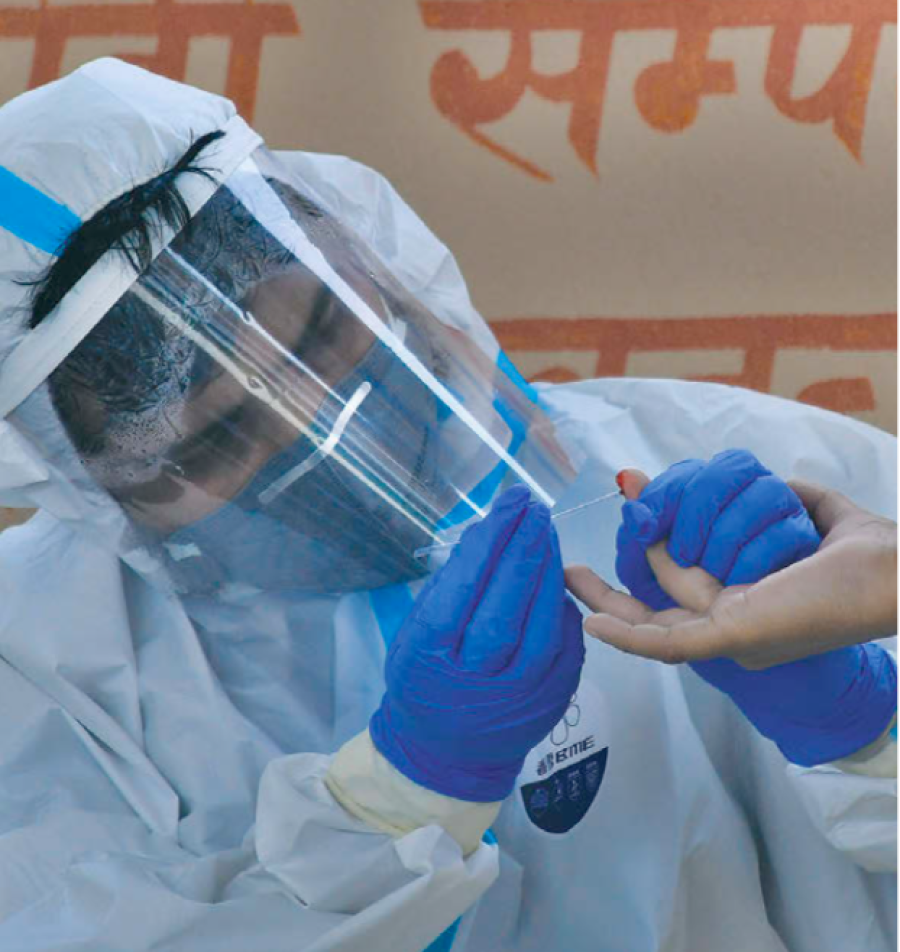National
Without proper contact tracing, the lockdown will have little effect, doctors say
Public health experts warn that failure to expand contact tracing, especially in Covid-19 hotspots, and not testing all suspects could be costly.
Arjun Poudel
On Sunday, 15 new cases of Covid-19 were detected in Nepalgunj, the highest number of coronavirus infections reported in the country in a single day so far.
All of Nepalgunj’s 15 cases were related to those previously identified in the city, according to Dr Basudev Pandey, director of the Epidemiology and Disease Control Division.
According to public health experts, the identification of the new cases points to a glaring failure on the part of the government to adequately trace the contact of all those who were previously infected with Covid-19. Even in cases where contacts have been traced, health officials have not conducted testing, despite the fact that most positive cases in the country have been asymptomatic.
“It would be a blunder to think that the virus can be contained simply by extending the lockdown,” said Dr Bhagwan Koirala, chair of the Nepal Medical Council. "The lockdown only gives us time to prepare.”
According to doctors, the government needs to take active measures to trace and test everyone who has come in contact with those infected with the coronavirus.
However, adequate contact tracing is not taking place, public health officials say.
It was only a week after the outbreak of Covid-19 in Triyuga Municipality in Udayapur district that officials from the Epidemiology and Disease Control Division reached the area. Up until then, local health workers had neither training nor the proper forms to conduct contact tracing.
"We only received training and got the forms after officials from the division came here," Krishna Prasad Khatiwada, a health worker in Udayapur, told the Post over the phone.
By the time contact tracing began, 28 people had already been infected with Covid-19.
Health workers had collected nasal and throat swabs of around 300 people for tests and declared contract tracing complete.
“But we searched again for people who had come in close contact with the infected, we found an additional 30 people,” said Khatiwada.
The Health Ministry has given the responsibility of contact tracing to the local level, which lacks human resource, training and supplies. Officials deployed in Udayapur conceded that health workers serving at the local level lacked basic knowledge of contact tracing.
"We found that they have not been able to explore deeply to trace the contacts of all those who came in close contact with infected people,” an official at the Health Ministry who was deployed in Udayapur told the Post.
Public health experts say that chances of Covid-19 continuing to spread are very high, if even a single person is missed.
The Health Ministry has been using a mobile application, ‘Hamro Swasthya’, and the webpage covid19.mohp.gov.np, where people can enter their personal details voluntarily.
As of Monday, over 30,468 people had entered their details, and among them, 328 people were from the ‘red zone’ meaning they could be infected with Covid-19.
The Epidemiology and Disease Control Division and provincial health offices have been monitoring their health, according to Dr Bikash Devkota, spokesperson for the Health Ministry.
But it is not just a failure to trace contacts; the practices adopted after tracing individuals are not adequate either, say doctors.
During the process of contact tracing, doctors involved in the treatment of Covid-19 patients collect the details of all those who came in contact with them. This information is passed on to the health workers at the local level, who in turn meet with the individuals identified and ask them to stay at home and take precautionary measures. If they display any symptoms, they are placed in isolation.
According to doctors and going by international practice, all those who came in contact with infected patients need to be tested. But in Nepal, contacts are not tested unless they develop symptoms, despite the knowledge that many cases in the country have been asymptomatic.
Dr Anup Subedee, a consultant infectious disease physician, said that even a minor mistake could be costly.
"The government should train health workers serving at the local level, activate all channels, including female community health volunteers, for contact tracing, ensure smooth supply of reagents, and increase testing of all suspects,” Subedee told the Post. "We do not know if any of that has been done."




 20.51°C Kathmandu
20.51°C Kathmandu














